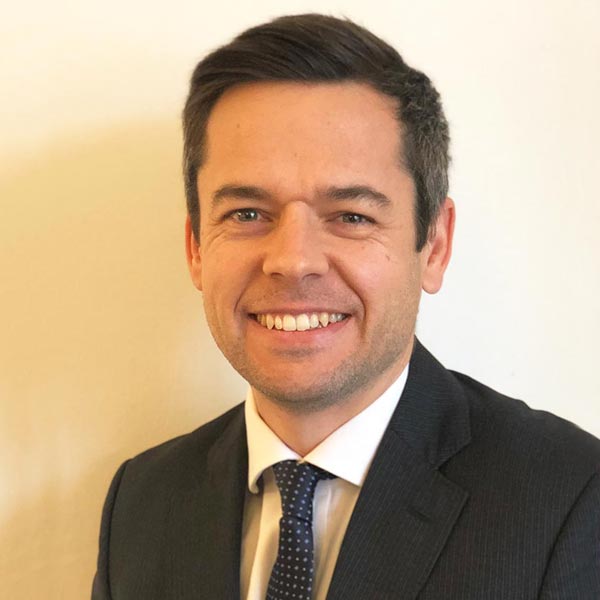
For first class day-case surgery, look no further.
Mr Ben Lamb
MBBS MA PhD. FRCS (Urol.)
Consultant Urologist
Consultant Urological and Robotic Surgeon Mr Ben Lamb MBBS MA PhD. FRCS (Urol.) specialises in prostate and bladder cancers and has carried out more than 350 robotic operations in his career. By adopting a patient-centred philosophy, and he uses his surgical skills in the most beneficial way.
Having achieved his MA in medicine at the University of Cambridge in 2002 followed by his Bachelor of Medicine & Bachelor of Surgery qualification (MBBS) at the University of London in 2005, he gained a PhD from Imperial College, London in 2011. He undertook his specialist urology training in hospitals in the south-east and undertook a fellowship in urological oncology and robotic surgery from the Peter MacCallum Cancer Centre in Melbourne, Australia.
Mr Lamb is experienced in treating a range of urological conditions, including lower urinary tract symptoms (LUTS); urinary tract infection (UTI); blood in the urine (haematuria) and semen (haematospermia); scrotal/penile lumps; incontinence; raised PSA; kidney stones; erectile dysfunction, and chronic pelvic pain.
He offers consultations to explain test results or answer any urological questions, meticulously outlines the advantages and risks of any procedure.
When treating prostate cancer, Mr Lamb adapts his use of robotic radical prostatectomy (RARP) to each individual. He utilises strategies to boost recovery, including performing Retzius-sparing prostatectomy, urethral sparing to maximise membranous urethral length and nerve sparing, carrying out nerve sparing in 8 out of ten cases. 80% of his patients are continent after six weeks, rising to 96% after six months. Non-nerve sparing and wide excision are techniques he uses to promote cancer clearance and his surgical margin rates (the amount of non-tumorous tissue around a tumour that is surgically removed) (25%) are in keeping with the national average (26.6%).
In addition to his caseload, Mr Lamb is Urology Cancer Lead and Urology MDT lead at Addenbrooke’s Hospital and has just been elected to the executive committee of the BAUS section of Oncology. Mr Lamb is involved in MDT (multidisciplinary cancer teams) research, and has written and presented on leadership, decision-making, and non-technical skills in this area. He finds teaching students, healthcare professionals and doctors about communication skills, MDT improvement and urological cancers, very rewarding.
- Overview
-
Consultant Urological and Robotic Surgeon Mr Ben Lamb MBBS MA PhD. FRCS (Urol.) specialises in prostate and bladder cancers and has carried out more than 350 robotic operations in his career. By adopting a patient-centred philosophy, and he uses his surgical skills in the most beneficial way.
Having achieved his MA in medicine at the University of Cambridge in 2002 followed by his Bachelor of Medicine & Bachelor of Surgery qualification (MBBS) at the University of London in 2005, he gained a PhD from Imperial College, London in 2011. He undertook his specialist urology training in hospitals in the south-east and undertook a fellowship in urological oncology and robotic surgery from the Peter MacCallum Cancer Centre in Melbourne, Australia.
Mr Lamb is experienced in treating a range of urological conditions, including lower urinary tract symptoms (LUTS); urinary tract infection (UTI); blood in the urine (haematuria) and semen (haematospermia); scrotal/penile lumps; incontinence; raised PSA; kidney stones; erectile dysfunction, and chronic pelvic pain.
He offers consultations to explain test results or answer any urological questions, meticulously outlines the advantages and risks of any procedure.
When treating prostate cancer, Mr Lamb adapts his use of robotic radical prostatectomy (RARP) to each individual. He utilises strategies to boost recovery, including performing Retzius-sparing prostatectomy, urethral sparing to maximise membranous urethral length and nerve sparing, carrying out nerve sparing in 8 out of ten cases. 80% of his patients are continent after six weeks, rising to 96% after six months. Non-nerve sparing and wide excision are techniques he uses to promote cancer clearance and his surgical margin rates (the amount of non-tumorous tissue around a tumour that is surgically removed) (25%) are in keeping with the national average (26.6%).
In addition to his caseload, Mr Lamb is Urology Cancer Lead and Urology MDT lead at Addenbrooke’s Hospital and has just been elected to the executive committee of the BAUS section of Oncology. Mr Lamb is involved in MDT (multidisciplinary cancer teams) research, and has written and presented on leadership, decision-making, and non-technical skills in this area. He finds teaching students, healthcare professionals and doctors about communication skills, MDT improvement and urological cancers, very rewarding.




